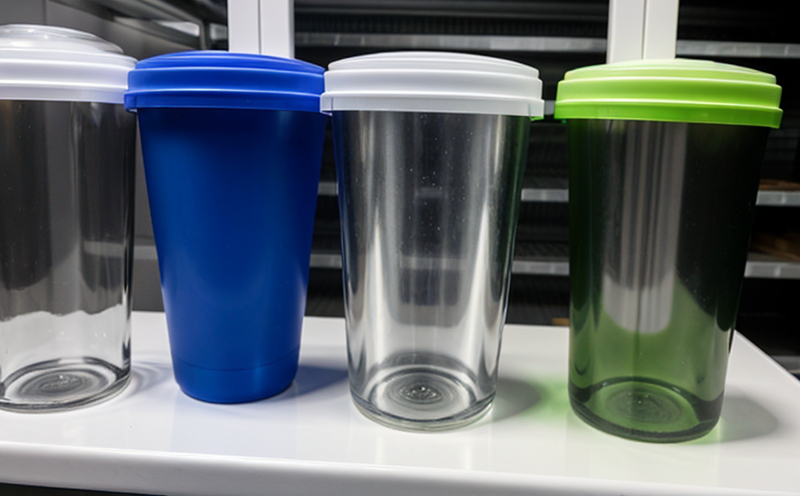ASTM C158-00 Compressive Strength of Glass Containers
The ASTM C158-00 test for compressive strength of glass containers is a critical method used in the packaging industry to evaluate the structural integrity and durability of glass packaging. This standardized procedure ensures that glass containers meet specific performance criteria, which are essential for product safety and quality assurance.
The ASTM C158-00 test focuses on determining the compressive strength of glass containers by applying a gradually increasing load until failure occurs. This method is particularly useful in identifying any weaknesses or defects within the container that could compromise its structural integrity under real-world conditions. The test can be used to evaluate various types of glass containers, including bottles, jars, and vials.
Understanding the compressive strength of a glass container is crucial for several reasons:
- Product Safety: Ensuring that the packaging can withstand external forces without cracking or breaking during transportation or handling.
- Quality Assurance: Confirming that each batch of containers meets the required specifications and standards.
- Regulatory Compliance: Meeting industry regulations, which often require proof of strength to ensure product safety and compliance with international standards like ISO 9001 or ASTM D4738.
- R&D Innovation: Helping R&D teams optimize the design and manufacturing process for new glass packaging products.
The test is conducted under controlled conditions, ensuring that factors such as temperature, humidity, and environmental stress do not influence the results. This standardized approach ensures consistency and reliability in evaluating compressive strength across different batches of containers.
During the testing process, it's important to note that the specimen preparation involves cleaning and drying the glass container thoroughly before applying the load. The loading device used is capable of applying a controlled force at a constant rate until failure occurs. Once the test is complete, detailed reports are generated, providing comprehensive data on the compressive strength of the tested containers.
The ASTM C158-00 method has been widely adopted due to its accuracy and reliability in assessing glass container performance. It plays a vital role in ensuring that products are safe for consumers while also minimizing waste and enhancing overall quality control processes.
Why It Matters
The importance of the ASTM C158-00 test cannot be overstated, especially in industries where glass packaging is a crucial component. By ensuring that glass containers have adequate compressive strength, manufacturers and suppliers can:
- Avoid Product Failures: Ensuring that glass containers do not crack or break during handling or transportation.
- Enhance Consumer Safety: Providing products in packaging that is robust enough to protect the contents from damage.
- Meet Regulatory Standards: Complying with international standards and regulations, which often mandate proof of strength for safety reasons.
- Increase Brand Reputation: Demonstrating a commitment to quality and reliability, which can enhance brand reputation and customer trust.
The test also supports continuous improvement in the manufacturing process. By regularly testing glass containers, manufacturers can identify areas for improvement and implement changes that lead to better product performance and durability.
In summary, the ASTM C158-00 method is not just a compliance requirement but also a tool for enhancing product quality and safety. It plays a pivotal role in ensuring that glass packaging meets the highest standards of integrity and reliability.
Benefits
- Enhanced Product Safety: Ensuring that glass containers are strong enough to protect contents from damage during transport or handling.
- Improved Quality Control: Providing detailed reports on the compressive strength of each batch, allowing for better quality management and control.
- Avoidance of Product Failures: Reducing instances where glass containers fail under stress conditions, which can lead to costly recalls or rework.
- Regulatory Compliance: Meeting international standards like ISO 9001 and ASTM D4738, ensuring compliance with industry regulations.
- Innovation Support: Helping R&D teams refine glass container designs for better performance and durability.
- Cost Efficiency: Minimizing waste by identifying weak or defective containers early in the production process.
- Enhanced Brand Reputation: Demonstrating a commitment to quality, which can enhance customer trust and loyalty.
- Environmental Sustainability: Optimizing glass container strength ensures they are used more efficiently, reducing waste and supporting sustainable practices.
The ASTM C158-00 test is an indispensable tool for ensuring that glass packaging meets the highest standards of quality and safety. It supports continuous improvement in manufacturing processes and helps manufacturers meet regulatory requirements while enhancing brand reputation.
Why Choose This Test
The ASTM C158-00 test for compressive strength of glass containers offers several advantages that make it an ideal choice for quality managers, compliance officers, R&D engineers, and procurement teams:
- Standardization: The ASTM C158-00 method is a widely recognized standard, ensuring consistency in testing procedures across different laboratories.
- Reliability: Providing accurate and reliable results that can be trusted for quality assurance purposes.
- Compliance Assurance: Ensuring compliance with international standards like ISO 9001 and ASTM D4738, which are essential for regulatory compliance.
- R&D Support: Offering valuable data that supports the development of new glass packaging products and process improvements.
- Cost Efficiency: Minimizing waste by identifying weak or defective containers early in the production process.
- Enhanced Brand Reputation: Demonstrating a commitment to quality, which can enhance customer trust and loyalty.
- Sustainability: Optimizing glass container strength ensures they are used more efficiently, supporting sustainable practices.
The ASTM C158-00 test is not only a compliance requirement but also a tool for enhancing product quality and safety. It supports continuous improvement in manufacturing processes and helps manufacturers meet regulatory requirements while enhancing brand reputation.





